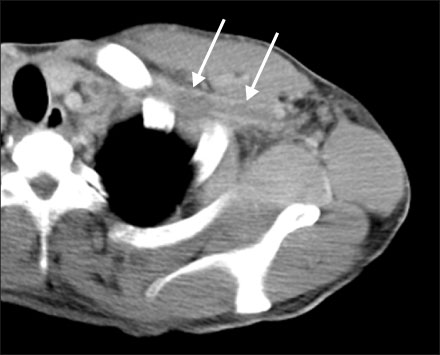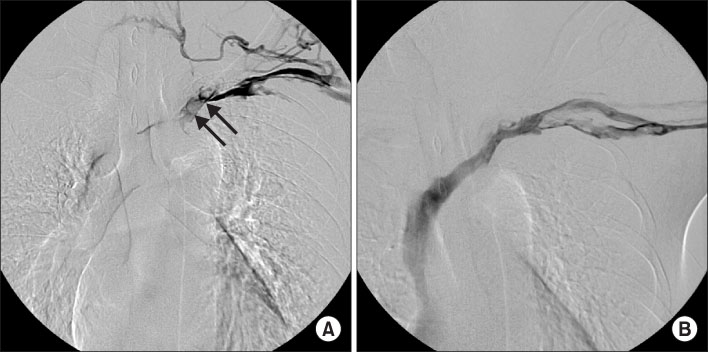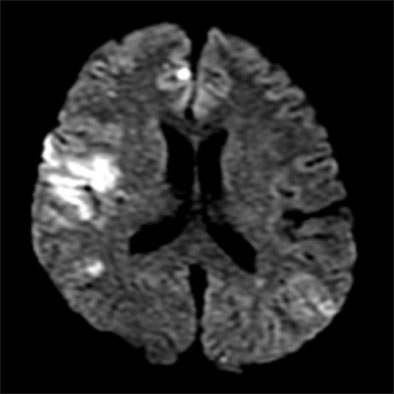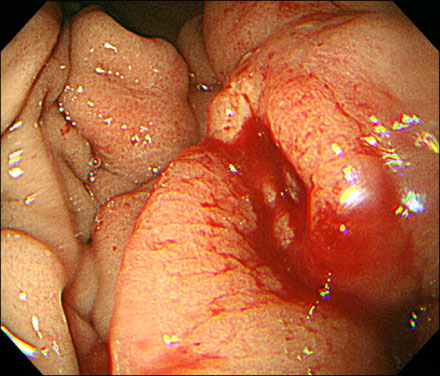Tuberc Respir Dis.
2011 Aug;71(2):134-138. 10.4046/trd.2011.71.2.134.
A Case of Trousseau's Syndrome with Catastrophic Course Triggered by an Intravenous Injection
- Affiliations
-
- 1Department of Internal Medicine, Hanil General Hospital, KEPCO Medical Foundation, Seoul, Korea.
- 2Department of Internal Medicine, Hanyang University College of Medicine, Seoul, Korea. shindh@hanyang.ac.kr
- 3Department of Radiology, Hanyang University College of Medicine, Seoul, Korea.
- KMID: 1846421
- DOI: http://doi.org/10.4046/trd.2011.71.2.134
Abstract
- Trousseau's syndrome is an unexplained thrombotic event that precedes the diagnosis of an occult visceral malignancy or appears concomitantly with the tumor. Upper extremity deep vein thrombosis is prevalent in patients with a central venous catheter. Furthermore, a peripheral intravenous injection may cause upper extremity deep vein thrombosis as well. However, a deep vein thrombosis has not been reported in the form of Trousseau's syndrome with a catastrophic clinical course triggered by a single peripheral intravenous injection. A 48-year-old man presented with a swollen left arm on which he was given intravenous fluid at a local clinic due to flu symptoms. Contrast computed tomgraphy scans showed thromboses from the left distal brachial to the innominate vein. The patient developed multiple cerebral infarctions despite anticoagulation treatment. He was diagnosed with stomach cancer by endoscopic biopsy to evaluate melena and had a persistently positive lupus anticoagulant. After recurrent and multiple thromboembolic events occurred with treatment, he died on day 20.
MeSH Terms
Figure
Reference
-
1. Varki A. Trousseau's syndrome: multiple definitions and multiple mechanisms. Blood. 2007. 110:1723–1729.2. Kucher N. Clinical practice. Deep-vein thrombosis of the upper extremities. N Engl J Med. 2011. 364:861–869.3. Chengelis DL, Bendick PJ, Glover JL, Brown OW, Ranval TJ. Progression of superficial venous thrombosis to deep vein thrombosis. J Vasc Surg. 1996. 24:745–749.4. Salmon AM, Dwyer R, Jauncey M, van Beek I, Topp L, Maher L. Injecting-related injury and disease among clients of a supervised injecting facility. Drug Alcohol Depend. 2009. 101:132–136.5. Girolami A, Prandoni P, Zanon E, Bagatella P, Girolami B. Venous thromboses of upper limbs are more frequently associated with occult cancer as compared with those of lower limbs. Blood Coagul Fibrinolysis. 1999. 10:455–457.6. Blom JW, Doggen CJ, Osanto S, Rosendaal FR. Old and new risk factors for upper extremity deep venous thrombosis. J Thromb Haemost. 2005. 3:2471–2478.7. Miesbach W. Antiphospholipid antibodies and antiphospholipid syndrome in patients with malignancies: features, incidence, identification, and treatment. Semin Thromb Hemost. 2008. 34:282–285.8. Miesbach W. Malignancies and catastrophic anti-phospholipid syndrome. Clin Rev Allergy Immunol. 2009. 36:91–97.9. Pruemer J. Treatment of cancer-associated thrombosis: distinguishing among antithrombotic agents. Semin Oncol. 2006. 33:2 Suppl 4. S26–S39.10. Akl EA, Rohilla S, Barba M, Sperati F, Terrenato I, Muti P, et al. Anticoagulation for the initial treatment of venous thromboembolism in patients with cancer: a systematic review. Cancer. 2008. 113:1685–1694.11. Piccioli A, Falanga A, Baccaglini U, Marchetti M, Prandoni P. Cancer and venous thromboembolism. Semin Thromb Hemost. 2006. 32:694–699.12. Rigdon EE. Trousseau's syndrome and acute arterial thrombosis. Cardiovasc Surg. 2000. 8:214–218.13. Piccioli A, Lensing AW, Prins MH, Falanga A, Scannapieco GL, Ieran M, et al. Extensive screening for occult malignant disease in idiopathic venous thromboembolism: a prospective randomized clinical trial. J Thromb Haemost. 2004. 2:884–889.14. An JY, Lee JE, Park HW, Lee JH, Yang SA, Park YK, et al. Lung cancer presented as painful swelling of lower legs. Tuberc Respir Dis. 2006. 61:398–402.15. Park MH, Jeong SI, Kee YW, Shin YJ, Oh DH, Seo KS, et al. A case of gastric adenocarcinoma presented as internal jugular vein thrombosis. Korean J Med. 2002. 63:552–556.
- Full Text Links
- Actions
-
Cited
- CITED
-
- Close
- Share
- Similar articles
-
- A Case of Trousseau's Syndrome Associated with Lung Cancer
- Catastrophic Antiphospholipid Syndrome Associated with Systemic Lupus Erythematosus Successfully Treated with Rituximab: A Case Report
- Catastrophic Antiphospholipid Syndrome Improved by Anticoagulation Alone
- Trousseau's syndrome in association with ovarian clear cell carcinoma
- Clinical associations of Trousseau's syndrome associated with cerebral infarction and ovarian cancer





